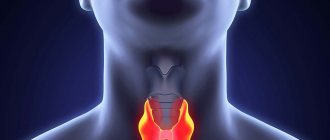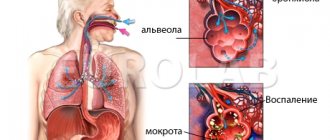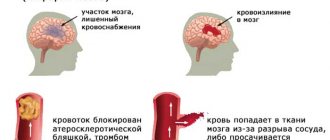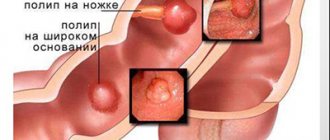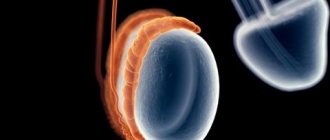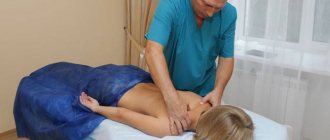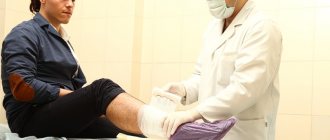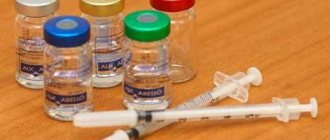Acute bacterial urethritis
The cause of bacterial urethritis is the entry of pathogenic bacteria into the human body.
Microorganisms enter the urinary system after unprotected sex with an infected partner.
Infection is possible after medical procedures performed through the urethral canal.
There are 2 forms of the disease:
- primary
- secondary
Types of bacterial urethritis: acute and chronic.
Symptoms of acute bacterial urethritis:
- Pain when going to the toilet
- The presence of a constant burning sensation in the urethral tract
- Presence of mucus and purulent discharge
- Swelling of the genitals
Specific urethritis, such as gonorrhea, often causes similar symptoms.
For the purpose of differential diagnosis, the patient is prescribed tests.
If acute urethritis is detected, the doctor will determine the timing of treatment after examination.
Features of inflammation
The urethra is a flexible urinary canal in the form of a hollow tube, which in men consists of the prostatic, membranous and spongy parts of the penis with an external outlet for urine excretion. When pathogenic agents enter the urinary canal, the symptoms of the inflammatory process in men are characterized by intensity and pain. The manifestation of pathological symptoms depends on the source of inflammation and the incubation period of the causative agent of urethritis. The main causes of the inflammatory process:
- Infections of the genital organs during sexual acts without contraception.
- Injuries to the genitals with ruptures of the mucous membrane, hypothermia.
- Urolithiasis, injuring the walls of the urinary canal.
- Decreased immunity, concomitant diseases, fatigue.
- Medical procedures that cause irritation of the mucous membrane.
- Poor nutrition with an abundance of sour, spicy and salty foods.
Urethritis in men can manifest itself after several days (gonorrhea agents), months (viral infection) and years (tuberculosis agent). With the allergic nature of the disease, the first signals of inflammation arrive after a few hours and appear clearly. Comprehensive diagnostics allows you to choose the most effective treatment aimed at eliminating both the symptoms and causes of inflammation.
Trichomonas urethritis
Trichomoniasis is a common disease of the urethra.
It is transmitted through sexual intercourse without barrier protection.
The reason is the entry of Trichomonas infection into the genitourinary system.
The disease can occur either with obvious manifestations or without any special symptoms.
Microorganisms parasitize men in the urethral canal, seminal vesicles, and prostate gland.
In women, the urethra and vagina are affected.
Forms of the disease: acute and chronic.
The transition from one form to another takes approximately 2 weeks.
Therefore, it is recommended not to ignore the first signs and begin timely treatment.
Depending on the state of the immune system, the incubation period can range from 5-7 days to a month.
Symptoms of Trichomonas urethritis:
- Itching in the urethral canal
- Burning sensation when urinating
- Yellowish or greenish discharge with a characteristic odor
- Sleep disturbance, anxiety, nervousness
In women, a more obvious manifestation is possible before menstruation and in case of hypothermia.
Causes and symptoms
The indirect cause of the disease is lifestyle and reduced defense mechanisms of the body, weak immunity, and lack of vitamins. The nature of urethritis can be either non-infectious or infectious.
The first type occurs as a result of mechanical trauma to the canal, sometimes as a result of medical procedures, such as the installation of a catheter. Pathological damage to the mucous membrane may be the result of a local allergic reaction. An allergen that enters the body with food is excreted in the urine, irritating the epithelium of the canal.
Damage to the delicate mucous membrane is possible with urolithiasis. Stones formed in the bladder come out and catch epithelial cells along the way. Injury to the mucous membrane is possible at the beginning of sexual activity during the first contacts. The peculiarities of the blood supply system of the pelvic organs determine the development of congestion in this area. A sedentary lifestyle contributes to this. An insufficient amount of oxygen reaches the tissues, local immunity decreases, and foci of inflammation and pathological changes in cells appear.
Factors contributing to the occurrence of nonspecific urethritis and other pathologies of the urinary system:
- sedentary lifestyle;
- alcohol consumption;
- promiscuous sex life;
- weak immunity;
- hypothermia;
- hormonal imbalances;
- chronic inflammatory diseases of the reproductive and urinary systems;
- frequent stressful situations.
Expectant mothers and women during menopause are at risk: the body's protective functions are below normal, and exacerbations of diseases occur. Added to this are serious hormonal changes. Complicated childbirth can also cause urethritis in a woman.
Infectious urethritis, as the name implies, is caused by various infectious agents. There are several routes of infection. The most common is sexual intercourse with unprotected contact. Along with it, it is also possible for representatives of pathogenic microflora to enter the home through a towel or bed linen. Parents who observe signs of an inflammatory process should be especially attentive. Co-sleeping with a child, which is common these days, can cause household infection of the baby through bedding.
The anatomical structure of the external genital organs in the female body and the proximity of the anus contribute to the entry of pathogens from the vagina and rectum into the urethra. The chances of this phenomenon are especially high in cases where a woman prefers to wear thongs. A narrow strip of tissue becomes a bridge for bacteria that can freely move from the anus. Another reason may be improper hygiene procedures.
Foci of general inflammation, such as caries, sore throat, tracheitis, are sources of infection of other organs and tissues in the body, where local immunity is not capable of adequate protection. Infectious agents spread through blood and lymph; respectively, these methods of spread are called hematogenous and lymphogenous.
A known cause of urethritis in both men and women is descending infection. Often this is cystitis or pyelonephritis.
Depending on the pathogen, infectious urethritis can be specific or nonspecific. In the latter case, the pathogens are E. coli, staphylococcus, streptococcus. The first type of disease includes numerous sexually transmitted infections:
- chlamydia;
- Trichomonas;
- candidiasis;
- gonorrhea;
- microplasma
A distinctive characteristic of bacterial urethritis is the period of incubation, or asymptomatic development of pathogenic organisms. Its duration is determined by the type of infection, ranging from a couple of days to a month. If pathogens of sexually transmitted infections enter the urethra, the acute phase of the disease can pass in a short time. Symptoms disappear, the disease becomes chronic. It can be asymptomatic or with minimal manifestations, for example, scanty purulent discharge or the appearance of crusts on the outside of the urethra after a night's sleep. A person becomes a source of infection for his partner without knowing it. Hidden infections cause dangerous complications, including infertility. They are also dangerous for a woman who is preparing for pregnancy, as they can cause disturbances in the development of the fetus.
Important! Even with minor signs of urethritis, it is necessary to seek medical help and undergo the prescribed course of treatment.
Common signs of urethritis are:
- general intoxication with fever and poor health;
- purulent discharge of a white, green color with an odor;
- burning sensation at the beginning and end of urination;
- pain in the lower abdomen;
- the urge to urinate occurs more often, many of them are false;
- swelling of the urethral mucosa;
- uncharacteristic painful redness;
- elements of red blood cells or blood, purulent formations in the urine;
- irritation of the intimate area, accompanied by itching and pain.
High values on the thermometer and other manifestations of intoxication are manifestations of acute urethritis. It can be not only a stage of primary infection, but also a period of exacerbation of a chronic disease. It is important for the patient not to delay a visit to a specialist. Diagnosis and treatment of urethritis in the early stages can stop exacerbations, achieve long-term remission, or completely get rid of the disease.
The exclusive symptoms of urethritis in men are pathological changes in the process of urination. These include:
- delay in the onset of urine output;
- decrease in jet intensity;
- process interruption;
- leakage of urine drop by drop;
- absolute delay.
Important! A dangerous consequence of a permissive attitude towards the disease is complete urinary retention, which requires urgent hospitalization and installation of a catheter. At the first symptoms in men, surgical treatment of urethritis is necessary.
The reason is that the mucous membrane affected by inflammation swells to such an extent that it blocks the narrow cavity of the urination channel. With urethritis in women, even intense swelling does not interfere with the process of urine excretion, since the urethra is quite wide, short and straight.
A feature of the symptoms of urethritis in women is the difficulty in accurately defining them. The proximity of the urethra and the vaginal opening makes it difficult to determine the source of heavy discharge, itching and pain.
The first manifestations of the disease in most cases subside on their own. The disease gradually turns into a chronic asymptomatic form. Scanty sparse discharge, slight discomfort in the intimate area, the appearance of purulent crusts at the exit of the urethra are evidence of pathology that may disappear completely. In this case, the affected area will spread, the ascending infection affects the prostate gland, bladder, ureters and kidneys. Gradually, the pathology also affects the internal genital organs.
Important! Recent studies have shown a connection between chronic urethritis in men and testicular cancer.
Acute herpetic urethritis
The cause of acute herpetic urethritis is the herpes virus types 1 and 2.
The virus can remain in the body for a long time and not manifest itself in any way.
It all depends on the state of a person’s immunity.
The stronger it is, the longer the asymptomatic course of the disease.
Routes of transmission of herpetic urethritis:
- Sexual
- Domestic
- Contact
- From mother to child during childbirth
Remember! Having sex with a condom does not reduce the risk of infection.
Herpes can be transmitted through contact of mucous membranes.
Symptoms of herpetic urethritis:
- Burning sensation in the urethral canal during urination
- Rash on the genitals
- Acute pain in the urethral tract
- Feeling of a full bladder after urination
- Frequent urge to go to the toilet
In addition to these manifestations, a person may have:
- Lack of strength
- Fatigue
- Weakness and unwillingness to work
An increase in body temperature is possible.
The infection is prone to relapses.
How to treat
Timely treatment will help avoid possible complications. It is carried out with the help of various medications - antibiotics, antiseptics, antioxidants, immunotherapy agents, vitamins, immunomodulators, and topical agents. The dosage is prescribed by the doctor. It is important to maintain proper nutrition and give up alcohol and cigarettes.
Antibiotics
A course of antibiotic therapy is prescribed after examinations: external examination, blood test, urine test, smear test. Then the type of urethritis and the pathogen that provoked it are determined. During treatment, the use of general antibiotics is excluded, since the sensitivity of the bacterium to the drug depends on its strain. What antibiotics are used for treatment?
Antibiotics of the nitroimidazole group:
- Metronidazole. An antimicrobial agent that promotes the destruction of protozoan cells disrupts the DNA synthesis of microorganisms, which contributes to their death. The drug is effective for trichomonas urethritis and is available as an injection solution, in the form of suppositories, and tablets. Possible adverse reactions: nausea, abdominal pain, headache, diarrhea, allergic reactions, anorexia, unpleasant taste in the mouth, dryness, urinary incontinence, change in color.
The medicine is contraindicated in case of leukopenia, organic lesions of the nervous system, renal failure, allergies to the components included in the composition.
- Secnidazole. It provokes the death of pathogen cells and is effective in the fight against Trichomonas bacteria. It comes in the form of granules that need to be dissolved before oral administration. May cause side effects: nausea, diarrhea, unpleasant taste in the mouth, stomatitis, leukopenia, allergic reactions, dizziness, ataxia. Contraindicated in case of blood diseases, central nervous system lesions, allergies to the drug.
Groups of tetracyclines:
- Doxycycline. Suppresses protein synthesis by microorganisms. Helps in the treatment of gonococcal and non-gonococcal urethritis. Release form: capsules, tablets, injection solution, oral solution. May cause digestive system disorders, as well as anemia, thrombocytopenia, and allergic reactions.
Contraindications: not recommended for children under 8 years of age, with liver failure, leukopenia, or allergies to the medicine.
Fluoroquinolones:
- Moxifloxacin. Suppresses the activity of microorganisms and is effective against many pathogens. Prescribed for a wide range of diseases, as well as during the treatment of urethritis in men. Available in the form of a solution for infusion and tablets. Frequent adverse reactions: abdominal pain, dyspepsia, dizziness, headache, change in taste. Contraindications: epilepsy, hypersensitivity, severe diarrhea, age under eighteen.
- Ofloxacin. Destabilizes the DNA of infectious pathogens and affects many bacteria. The drug is prescribed during the treatment of any type of urethritis. Dosage form – capsule. Possible side effects: disorders of the digestive and nervous system, disturbances of taste, hearing, smell, allergic reactions. Contraindicated in children under 18, during epilepsy, after traumatic brain injury, stroke, if there is an allergy to the drug.
- Levofloxacin. Suppresses DNA synthesis of many microbes. Release form: tablets, solution for infusion. Possible unpleasant reactions: digestive system disorders, decreased blood pressure, hypoglycemia, nervous system disorders, sensory organ disorders. Contraindications: epilepsy, age under 18, tendon damage after treatment with quinolones.
Triazoles:
- Fluconazole. An agent that destroys the fungus helps during the treatment of candidal urethritis. Release form: capsules, tablets, solution for oral administration and infusion, syrup. Side effects: nausea, flatulence, change in taste, dizziness, headache. Find out more about how to take fluconazole.
Contraindicated when taken simultaneously with terfenadine and astemizole.
Quinoxalines:
- Dioxidine. An antibacterial agent that helps when other medications are ineffective. Available as an ointment, aerosol, solution for injection, external, intracavitary use. Possible reactions: allergies, after intravenous or intracavitary exposure, disorders of the digestive system, fever may occur, after topical application - dermatitis. Contraindications: adrenal insufficiency, allergy to the drug.
Macrolides:
- Erythromycin. The antibiotic blocks the synthesis of proteins of microorganisms, which leads to their destruction. One of the safest and most effective remedies used in the treatment of urethritis in men. It is taken intravenously and orally. Side effects include digestive disorders, tinnitus or hearing loss. Contraindicated if the patient has significant hearing loss, as well as when used together with terfenadine, astemizole.
- Clarithromycin. An antibiotic derivative of erythromycin with a stronger antibacterial effect. Taken orally. Side effects: disorders of the digestive system, system. Contraindicated in children under 12 years of age with allergic reactions to the product.
Azalides (macrolide derivatives):
- Azithromycin. Suppresses protein synthesis of pathogens, has cellular and extracellular effects. Helps during the treatment of gonorrheal, non-gonorrheal urethritis. Frequent side effects: digestive system disorders - diarrhea, nausea, abdominal pain. Contraindications: liver, kidney failure, hypersensitivity.
At the moment, macrolides are used to treat various types of urethritis - one of the safest drugs. Previously, antibiotics of the penicillin group, for example, bicillin, were often prescribed, but due to the development of resistance to it by many microorganisms, it is prescribed in exceptional cases.
Pills
Antihistamines will help avoid allergic reactions and relieve possible side effects:
- Tavegil. Has a long lasting effect. Helps with different types of allergic reactions of the body. You need to take the drug twice a day - morning and evening. Possible side effects: nausea, headache, dry mouth. Contraindicated in children under one year of age when taking MAO inhibitors.
Medicines that restore the gastrointestinal tract are also useful:
- "Yogurt". Normalizes intestinal microflora, improves the digestion process, and is useful for the prevention of dysbacteriosis. It is taken simultaneously with antibiotics, which have a negative effect on the body. You need to take from two to five tablets per day, with food, for several weeks. In order not to reduce the effectiveness of the antibiotic, breaks between doses should be at least an hour and a half.
Vitamins:
- Vitamin B, preparation “B Complex” from “Biotek”. Improves cellular metabolism, useful in complex therapy of urethritis in women and men. Take one tablet daily with food.
- Vitamin PP or nicotinic acid. Helps in the treatment of infectious diseases. It should not be taken by hypertensive patients, allergy sufferers, or diabetics.
Other medicines
For urethritis, complex therapy is used, so during treatment, as a rule, several types of medications are prescribed at once.
Immunomodulators:
- Polyoxidonium for injection. Helps the body cope with infectious diseases. Prescribed as injections of 6 mg daily for three days, then a day off, and again taking the drug. Five to ten injections of the drug are carried out.
Antiseptics for washing:
- Methylene blue. The disinfectant is used as a 0.02% solution with water.
- Hydrocortisone. If the entire urethra is affected, installations with this drug are used.
Antiviral ointment:
- Acyclovir. A topical ointment that will be especially effective in treatment if a man suffers from herpes urethritis. Apply to the affected area five times a day, take from five to ten days.
Avoiding such serious treatment will help by following preventive measures - reducing the frequency of sexual intercourse with untested partners, using condoms, constant careful hygiene, a diet that excludes foods that irritate the mucous membranes, and drinking at least one liter of water during the day.
Acute urethritis due to STDs
The cause of acute urethritis can be specific microorganisms.
In this case, the disease has a long asymptomatic course.
The first signs may appear in men after 3 days, in women - 5 days after infection.
Depending on what STI causes the disease, the first signs vary:
- With gonococci, strong purulent discharge is observed
- With chlamydia, pus is released from the urethral canal
- Herpes causes severe pain
- If the culprit is Trichomonas, foamy discharge appears
If any signs of acute urethritis appear, you should consult a doctor.
Self-diagnosis and self-medication are not recommended.
This can lead to serious consequences and complications.
Treatment
Treatment tactics are selected based on the nature of the occurrence of urethritis. According to the standard, it includes:
- establishing and clarifying the diagnosis;
- drug therapy;
- re-examination.
The course of treatment is selected individually, depending on the type of disease. The following tools are commonly used:
- antibiotics (selected taking into account the sensitivity of microorganisms to them);
- preparations for restoring intestinal microflora;
- anti-inflammatory;
- antihistamines;
- immunostimulants and immunomodulators;
- vitamin complexes.
Important! Self-medication significantly increases the risk of complications. Only a urologist can correctly select medications based on the results of the examination.
Selection of medications
Treatment is usually carried out on an outpatient basis, but in case of severe purulent complications, hospitalization is required. Its duration depends on the form of urethritis and varies from several days to several weeks.
To achieve an additional effect, physiotherapy (warming applications, electrophoresis, etc.) and local treatment (sitz baths based on herbal decoction, etc.) can be performed.
A mandatory element of treatment is diet. It is necessary to exclude salty, smoked and spicy foods, and alcoholic drinks. In case of acute urethritis, the diet should be based on fermented milk products, and drinking plenty of fluids is recommended.
Restrictions are also imposed on sexual activity during therapy, physical activity, hypothermia and other provoking factors.
How dangerous is the disease?
Acute urethritis with urolithiasis
The presence of urolithiasis in a patient can provoke the appearance of acute urethritis.
Salts are formed in the kidneys, which are excreted during urination.
Crystals can injure the urethral canal and cause inflammation.
Symptoms do not appear immediately; periodically the patient feels discomfort when urinating.
With the development of the inflammatory process, urethritis takes on an acute form.
The signs become more obvious and severe discomfort is caused.
Diagnostic tactics
To confirm the diagnosis, it may be necessary to study prostate secretions
Diagnosis of this disease is based on the collection of anamnestic data (about the nature of sexual activity, the presence of hemorrhoids and constipation, the predominance of a sedentary lifestyle) and the results of an endoscopic examination (detection of the source of inflammation). The doctor should also take into account the patient’s complaints about deterioration in sexual function.
In men, the secretion of the prostate gland is additionally examined: with congestive urethritis, a large number of leukocytes are recorded in it.
Acute urethritis during pregnancy
Acute urethritis is a common disease in women during pregnancy.
This is due to the fact that during this period:
- Hormonal levels change
- The protective functions of the immune system are weakened
Women are strongly encouraged to get tested for STIs before conceiving.
This allows you to identify hidden infections and undergo drug treatment.
If the disease progresses during pregnancy, treatment is prescribed according to special regimens.
Medicines are selected with minimal impact on the fetus.
Complications
With male urethritis, the following types of complications are possible:
- In cases where there is no treatment for urethritis or if it is not treated correctly, the disease can go from acute to chronic.
- The occurrence of prostatitis.
- Vesiculitis is inflammation of the seminal vesicles.
- Orchitis is inflammation of the testicle.
- Balanitis is an inflammation of the skin on the head of the penis.
- Balanoposthitis is an inflammation of the inner layer of the foreskin.
- Narrowing of the urethra that occurs as a result of lack of proper treatment for urethritis, or during the chronic course of this disease. Advanced cases of narrowing require surgical intervention.
Such a number of existing complications in male urethritis is due to the fact that inflammation of the urethra can reach other organs and begin to develop there: the organs of the scrotum, bladder and prostate gland can become victims of urethritis. To avoid complications, special prevention of urethritis is required.
Acute urethritis: tests
The diagnosis and treatment of the disease is carried out by a urologist or gynecologist.
Before making a diagnosis, the doctor prescribes tests:
- Urinalysis to detect inflammation
- Blood test for antibodies
- Urethral swab
- Urethral scraping
An examination using a cystoscope is often prescribed.
The number of leukocytes, mucus, red blood cells, epithelium, and protein is examined in the urine.
Urine culture allows you to identify the type of infection that caused the inflammatory process in the urethral canal.
A blood test is given to determine antibodies to the infection.
They are produced by the immune system.
Blood is examined using the following methods: ELISA and PCR.
In addition to detecting antibodies, using a blood test, you can:
- Determine the form of the disease: acute or chronic
- Find out if there was an inflammatory process before
PCR diagnostics allows you to determine the presence of infection even in a small volume.
This method is considered the most reliable.
Clinical signs
By identifying the symptoms that a patient exhibits, a diagnosis can be made. In some cases, clinical data is insufficient, as a result of which laboratory and instrumental studies are carried out. A man who experiences unbearable pain in the urethra after or during urination should definitely diagnose other manifestations.
Specific manifestations:
- Inability to pass urine;
- Decreased sexual activity (potency);
- Nervousness and neurasthenia;
- Ejaculation is practically absent;
- Sleep and appetite are disturbed;
- Frequent urge to urinate;
- Itching, causing discomfort, pain and burning;
- Allergic rash on the penis, scrotum.
When interviewing a sick man, the doctor determines any symptoms that appeared along with pain in the urethra. Burning in the urethra is also a severe manifestation that impairs the quality of life. With a combination of certain symptoms, diseases such as prostatitis, cystitis, urethritis or chlamydia can be suspected. After which the sick person undergoes a complete examination and some tests.
Review of inexpensive and effective suppositories for prostate adenoma
The prostate gland is also known as the second heart of a man. The organ controls most of the functions of the male body. A man’s ability to fertilize depends on the stable and coordinated functioning of the gland. Disturbances in the functioning of the gland negatively affect the emotional and psychological state of a man, the figure becomes more vague and overweight.
The most dangerous disease is prostate adenoma. Pathology therapy is carried out comprehensively. Inexpensive and effective suppositories are the most effective against prostate adenoma; their action, depending on the active ingredients, is aimed at eliminating the symptoms of the disease and improving the general condition of the prostate.
Complications
In their youth, men rarely pay due attention to their own health, much less think about such an unpleasant pathology as adenoma. Pathological processes are most often diagnosed in middle-aged men. According to urologists, symptoms occur against the background of age-related changes in the body. That is why in medicine there are no clearly defined reasons that provoke the growth of gland tissue. The disease is diagnosed even in men who led a healthy lifestyle in their youth.
As pathology develops, pathological processes affect organs adjacent to the gland.
If therapy is not carried out in a timely manner, the following complications are possible:
- Cystitis and urethritis;
- Pyelonephritis;
- Stone formation;
- Kidney failure.
A third of patients diagnosed with prostate cancer had previously been diagnosed with a prostate adenoma.
Suppositories for prostate adenoma are the optimal form of therapy. As a rule, such treatment is supplemented with a course of pill therapy.
Benefits of using suppositories for adenoma
First of all, suppositories are accessible, inexpensive and effective preparations. Benefits of using suppositories:
- Comfortable use;
- Good tolerance;
- The suppositories act locally - only on the pathological focus;
- Fast action;
- Excellent compatibility with all dosage forms.
Suppositories have a complex effect, doctors select the drug based on a set of factors: the patient’s condition, the degree of organ damage, the presence of complications.
In accordance with the diagnostic results and the desired result, the specialist prescribes a drug based on natural or synthetic active substances that have different effects on the body and symptoms.
Composition of drugs
Candles have an oil base; it performs several important functions:
- Protects active ingredients from the destructive effects of external factors;
- Promotes complete penetration of all components into the body.
Suppositories are prescribed at different stages of the disease.
Suppositories for the treatment of prostate adenoma - types, composition, action
| Group of drugs | Compound | Name of suppositories | Action |
| Antibiotics | Rifampin, norfloxacin | "Bioprost", "Vitaprost", "Prostopin" | Neutralize inflammation, suppress pathogenic microflora in the gland and neighboring organs. |
| Anti-inflammatory | Diclofenac, thiotriazoline, other non-hormonal anti-inflammatory drugs | "Ichthyol", "Prostatilen", "Diclovit", "Voltaren" | Neutralize discomfort, swelling, pain when urinating. |
| Antispasmodic | Papaverine | "Papaverine hydrochloride", "Buscopan" | Normalizes the process of urination |
| Analgesics | Promedol, benzocaine | "Prostatilen", "Anestezol" | Eliminate discomfort and improve general condition |
| With natural, natural ingredients | Plant extracts, propolis, extracts from the prostate gland of cattle. | "Prostopin", "Prostatilen", "Anuzol" | Minimize the risk of complications, neutralize the symptoms of the disease, slow down the development of tumor processes, normalize hormone levels, restore erectile function |
Candles with a magnetic effect are also used. The main active ingredient is barium ferrite. The composition additionally includes parmidine. The drugs normalize blood flow and activate blood flow to the prostate gland.
Review of the best candles
The range of drugs is huge, it is important to choose the most effective ones.
Ichthyol suppositories
They have a complex effect:
- Pain reliever;
- Antiseptic;
- Disinfectant.
The drug normalizes blood flow in the groin area.
Suppositories based on ichthyol have an unpleasant, pungent odor. The main advantage is the absence of side effects and contraindications.
Candles with papaverine
Used during periods of exacerbation and chronic forms of pathology. The drug eliminates prostate spasms.
Suppositories neutralize discomfort and activate blood flow.
Prostatilen
Neutralizes swelling, inflammation, stagnation, prevents the formation of blood clots, and restores the function of the gland. The main active component, bovine prostate extract, is a complex of proteins with a powerful positive effect, effective in acute and chronic forms of pathology. A drug based on prostatilen normalizes the process of urination, neutralizes discomfort, restores libido and prevents premature ejaculation.
Diclofenac
Preparations based on non-steroidal anti-inflammatory components are prescribed during exacerbations and for the treatment of chronic forms of the pathology. Diclofenac has a complex effect:
- Eliminates swelling;
- Neutralizes spasms;
- Eliminates discomfort and heat.
Contraindications to the use of Diclofenac suppositories are kidney and liver pathologies, hypertension.
Vitaprost
The active ingredient is bovine prostate extract. The action of the component corrects and restores the functioning of the gland. The stimulating effect is used as therapy for adenoma pathologies, male infertility and erectile dysfunction.
"Vitaprost" is distinguished by its rapid action and the absence of contraindications for use. The drug can be taken without prescription from a specialist.
Voltaren
The drug comes in the form of tablets, injections and suppositories. The advantage of candles is their complex action:
- Anti-inflammatory;
- Anesthetic;
- Antipyretic.
The active component is quickly absorbed into the blood, this is responsible for the rapid effect of the drug. The advantage of suppositories is that the active substance is removed from the body.
Contraindications to the use of Voltaren are hemorrhoids and rectal fissures.
Anestezol
The complex product is created on the basis of four components that have a complex effect:
- Eliminate discomfort;
- Neutralizes inflammation;
- Promotes tissue healing.
The multicomponent composition of the drug increases the effectiveness of treatment by 3-4 times.
The use of Anestezol eliminates pain when urinating.
In rare cases, patients experience rash, itching, and bowel movements. You can start using candles only after reading the instructions.
Candles at home
Recipe No. 1
To prepare candles according to a folk recipe you will need:
- Propolis – 40 g;
- Wax – 40 g;
- Fat – 180 g.
All components are mixed. The mixture is thoroughly ground and allowed to cool completely. When the mixture hardens, it is cut and shaped into candles. The finished drug is stored in the refrigerator.
